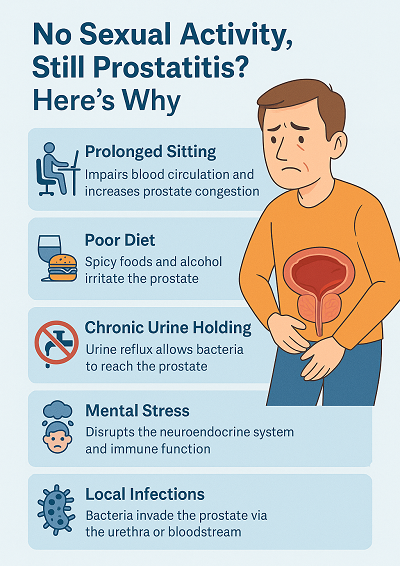No Sexual Activity, Still Prostatitis? Here's Why
In common perception, prostatitis always seems closely linked to irregular sex or unsafe sexual behaviors. However, clinical cases are not rare: some young men who never had sex also have prostatitis. Symptoms like urinary frequency, urgency, and perineal distension severely impact their daily lives and mental health. So, what causes prostatitis without sexual activity?

Prolonged Sitting: A Stealthy' Health Killer'
Modern lifestyle changes have made sitting the norm. Whether students study at desks for long hours or office workers face computers all day, they spend hours or even a full day sitting. Prolonged sitting impairs local blood circulation in the prostate, causing prostate tissues to remain congested.
This chronic congestion acts like a ticking time bomb, gradually weakening the prostate's defenses and creating ideal conditions for bacterial growth and inflammation. Moreover, sitting raises the perineal temperature, creating a warm environment conducive to the growth and reproduction of pathogens. Studies show those sitting more than 8 hours daily face several times higher prostatitis risk than active individuals.
Poor Diet: The Body's 'Chronic Poison'
Diet plays a key role in the development of prostatitis. Spicy, greasy, and stimulating foods are popular but strongly irritate the prostate. Consuming too much spicy food can cause the blood vessels in the prostate and urethra to dilate and become congested, increasing the burden on the prostate and potentially leading to abnormal secretion of prostatic fluid.
Heavy long-term alcohol intake also triggers prostatitis: alcohol reaches the prostate via blood, causing congestion, edema, and reduced immunity. Additionally, long-term consumption of high-fat and high-sugar diets can lead to obesity. The accumulation of fat tissues in the body can interfere with the normal functions of the endocrine system, thereby having adverse effects on the prostate.
Chronic Urine Holding: Urine's 'Reverse Damage'
Holding urine is a seemingly minor but highly harmful habit. When there is a need to urinate, if one does not do so promptly, the urine in the bladder will accumulate, and the pressure will gradually increase. Urine may not only backflow into the prostate ducts but also transport bacteria, potentially triggering inflammation.
Furthermore, holding urine can also affect the normal physiological functions of the bladder and urethra, disrupt the normal rhythm of the urinary system, cause harmful substances in the urine to remain in the body for an excessively long time, and further damage the prostate. This urine reflux and bacterial growth is a common cause of prostatitis in non-sexually active people.
Mental Stress: An Invisible' Health Threat'
In a fast-paced modern society, people endure immense pressure from studies, work, and life. Chronic stress, anxiety, or depression disrupts the neuroendocrine system, causing autonomic dysfunction. This impairs prostate blood circulation and secretion, inducing prostatitis. Stress also lowers immunity, increasing vulnerability to pathogens. Many young people who have no sexual life are under great mental stress due to academic and employment pressures, which increases their risk of developing prostatitis.
Local Infections: Unavoidable 'Pathogen Invasion'
While no sex reduces the risk of sexually transmitted infections, it does not completely eliminate the possibility of pathogen infection in the prostate. Reversal infection of the urethra is a common route of infection. When bacteria, viruses, mycoplasma, chlamydia, etc. infect the urethra, these pathogens can ascend along the urethra and invade the prostate, causing inflammation.
In addition, infection foci in other parts of the body, such as dental caries and tonsillitis, may also allow bacteria to enter the prostate through the bloodstream, leading to prostatitis. There are also some special cases, such as improper operations like catheterization or urethral instrument examinations, which may also bring bacteria into the urethra and prostate, causing infection.
Facing prostatitis, the choice of treatment method is of vital importance. Diuretic and Anti-inflammatory Pill shows unique advantages in the treatment of prostatitis. It is made from natural Chinese herbal ingredients and follows traditional TCM formulations, with functions such as clearing heat, resolving toxins, activating blood, resolving stasis, and promoting diuresis.
It effectively eliminates prostate inflammation, improves local blood flow, relieves pain and discomfort, regulates the immune system, fundamentally improves the prostate's internal environment, promotes tissue repair and regeneration, and helps patients overcome prostatitis.
The causes of prostatitis are diverse. Even if there is no sexual activity, the possibility of its occurrence should not be ignored. Understanding these factors and adopting healthy habits—exercise, a balanced diet, timely urination, and stress management—is vital for prevention. If prostatitis unfortunately occurs, you should seek medical help promptly and choose an appropriate treatment method. Diuretic and Anti-inflammatory Pill may offer new hope, restoring health to our lives.



